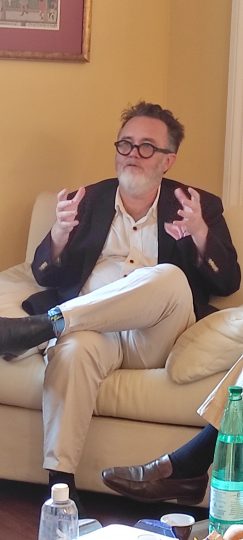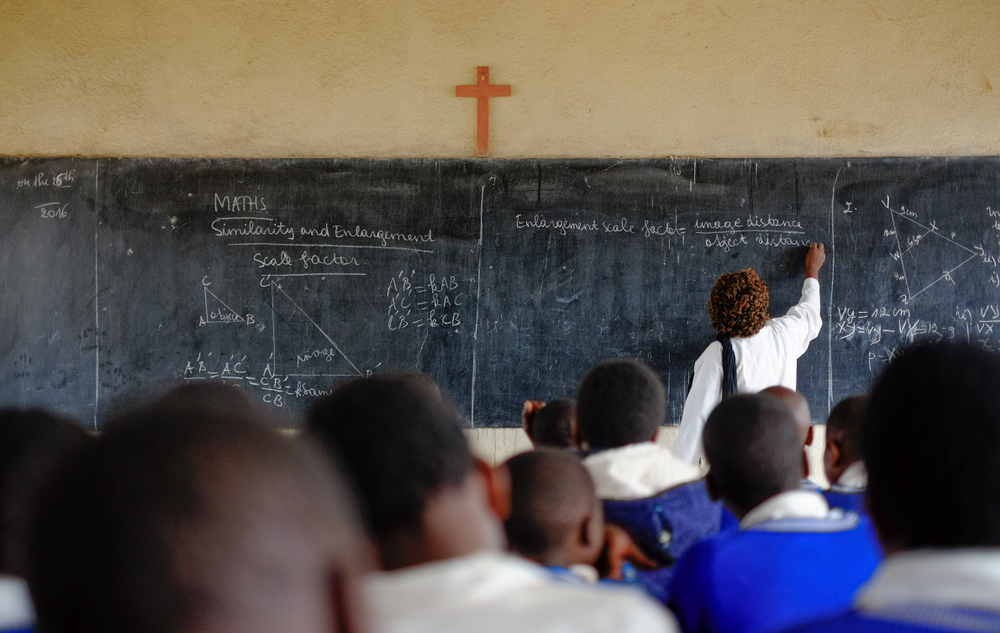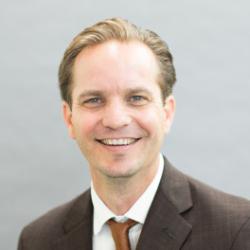What’s the foundation of a good education system? Creativity and courage, according to Rod Dreher, author of the bestselling book “Live Not By Lies: A Manual for Christian Dissidents.” Dreher argues it is these creative and courageous educators who will best “dare to disrupt” the Marxist domination of students’ and teachers’ freedom of speech and critical thinking.
Writing his book required Dreher to collect personal testimonies; he spent months interviewing former Soviet and Nazi dissidents who told him how they refused to bow to the collectivist totalitarian ideologies of their day. They “never gave up on their [first] principles” of faith and freedom. They flatly refused the live a life of deceit, one of “absolute lies” while heroically working to preserve the truths of the human condition for generations to come.
At an August event in Rome, Dreher said many of those he interviewed ultimately found political refuge in the United States, the then-freest nation on earth. However, ironically, they now forewarn that their adoptive homeland, along with many Western republics, is teetering on the brink of “soft totalitarianism.” By this, Dreher means that former dissidents see today’s citizens as weak-willed vassals of collectivist governments. They are attracted to socialist ideals by means of clever “social justice” language with promises of “a secure future” and “equality for all.” It will be brought to them not by “Big Brother” but by a “Big Mother” nanny state. Therefore, Dreher said we are quickly moving toward the realization of a seductive Huxleyan “Brave New World” rather than Orwellian “1984” police state.

Christian resistance to totalitarianism regimes “begins with total integrity,” personally promising to “never advocate for or live any of the lies” of false ideologies. According to Dreher, we need to stop supporting journalism, media, or other platforms of “propaganda” that fail to uphold the full and consistent truths of Judeo-Christian anthropology, the eternal “basis” for our inalienable rights and liberties.
Dreher made the further point that resistance implies “serious suffering” and not always silently. He explained that human life is not demarcated by la dolce vita, but rather gains its deepest and clearest significance when we painstakingly battle to preserve what is most important to us as dignified children of God: freedom, faith, and flourishing. Suffering is Christianity’s secret “weapon”; it is the Christian modus operandi to sustain “values without which we aren’t willing live.” Indeed, Dreher said that one thing her learned from the former dissidents was that we should “fight for the right to suffer” in an age when comfort-seeking completely warps and diminishes any gritty defence of liberty.
During his response to questions, Dreher underscored that collectivist ideologies have already completely taken over the academy, particularly in America. What’s worse, he said, is that they have now sewn roots “deep down” into primary and secondary schools. Nowadays, youth arrive at universities with ingrained belief patterns that are entirely beholden to cultural Marxism. For Dreher, the cultural Marxist vision is so entangled in the U.S. educational systems that it has become “absolutely intolerant” of any criticism or discussion to the contrary. It “demands total submission” to what is “no longer a political movement,” but rather, according to Dreher, a “secular religion.”
 Dreher gave the example of a journalist whom he had met in Budapest. The young professional had attended a one-year graduate program at Harvard. When Dreher asked him how it went at “America’s top university” the Hungarian complained how “fragile the American elite were,” that they were “fearful of sharing frank opinions” on serious matters of public policy, economics, and culture. He said all the Harvard professors worked to create “safe spaces” in their lecture halls where “one and only one vision could be tolerated.”
Dreher gave the example of a journalist whom he had met in Budapest. The young professional had attended a one-year graduate program at Harvard. When Dreher asked him how it went at “America’s top university” the Hungarian complained how “fragile the American elite were,” that they were “fearful of sharing frank opinions” on serious matters of public policy, economics, and culture. He said all the Harvard professors worked to create “safe spaces” in their lecture halls where “one and only one vision could be tolerated.”
Following on his acclaimed book “The Benedict Option,” Dreher suggested the entrepreneurs try first creating their own small intellectual and spiritual communities, “doing home seminars and in other private settings” before launching any largescale institutional projects. He said that Fr. Tomislav Kolakovic (a Croatian-born Jesuit to whose memory “Live not by Lives” is dedicated) is a wonderful example about what we can today. After fleeing Croatia to Slovakia during the Nazi collaboration with Zagreb, Kolakovic created underground circles of faith and academic discussion in order to prepare Slovaks to resist an eventual Soviet communist takeover after the war. Dreher said the Jesuit priest set up a several “pockets of resistance” which resulted in a resilient network of religious and non-religious alliances to keep Western values of freedom alive. “Ultimately they triumphed in 1989, thanks in large part to this deep network.”
“We have to try and imitate this start before it’s too late, starting small and thinking long-term,” Dreher said – just like Kolacovic.
As an ideal example of such a pocket of Italian resistance, Dreher pointed to the G.K. Chesterton Scuola Libera (“free school”) in the Adriatic town of San Benedetto del Tronto “where families of concerned parents just decided to pull together” and started their own completely private school with no state subsidies. Dreher’s admiration for the Chesterton school is based on the fact that parents actively rejected a binding secular system that was destroying their children’s free intellectual and spiritual development. “They saw the problem and actually did something about it.”
Though he issues serious warnings, Dreher maintains a position of hope, believing that Western freedom might well collapse before our very own owns but “we can always place our confidence in God so that whatever does happen in the end” falls according to his plan. He said we cannot simply be optimists, thinking “things will work out just because,” but rather practice the theological virtue that allows us to trust in God’s Providence even if it’s apparent that we may not get our desired outcome, saying: “What I do know is that suffering has a true purpose” in the Christian life and that it is through this [painful experience] that I know I am surely on the right path” of ultimate justice and personal redemption.

